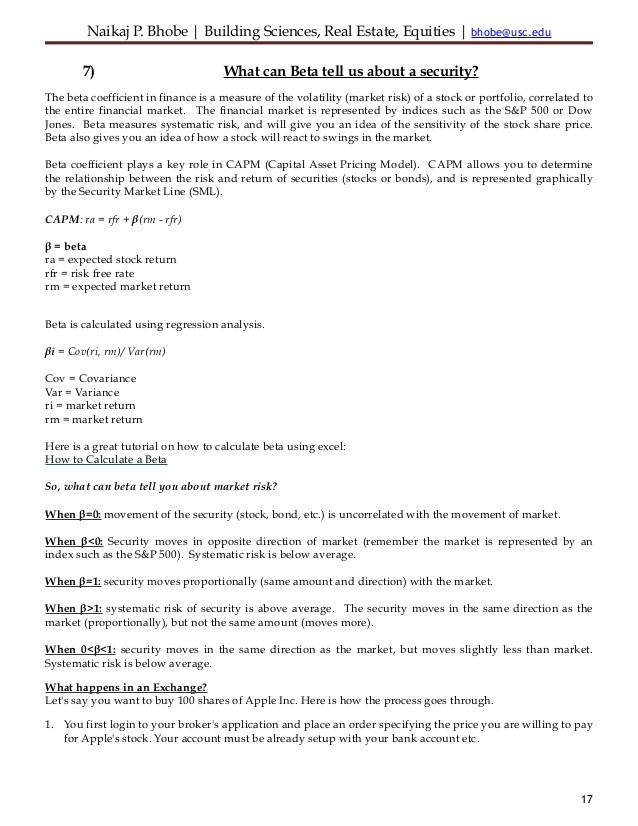What Is Beta in the Stock Market
Post on: 18 Апрель, 2015 No Comment

Definition
Beta is a calculation that compares a stock’s historical performance against the overall performance of the entire stock market. This quantifies the stock’s relative volatility. Volatility is a measure of how much prices change during fluctuation. All stocks fluctuate, but for some the price swings are much more significant. Beta corresponds to the stock’s volatility as a multiple of the overall market. A beta of 1 implies volatility that is approximately the same as the overall market. A beta of 2 suggests the stock is twice as volatile while a beta of 0.5 implies the stock is half as volatile.
Risk
Risk generally increases with beta. A high-beta stock is not appropriate for investors who seek relatively tame stocks. However, the potential rewards match the risk. For investors willing to accept large potential losses, a high beta stock can be lucrative if it performs well. During times of high overall stock market volatility, conservative investors may prefer stocks with betas that are less than 1, which should be less volatile than the overall market.
Lagging Indicator
Beta is calculated based on historical performance of a stock. It is obviously not possible to include data from prices that have not yet occurred. Such indicators are lagging since they are entirely based on past information. Thus the beta indicator is not a guarantee that volatility will behave as the calculations suggest. A stock’s volatility can change with time and the beta may also change values along with price.
Corporate Events
References
More Like This
How to Calculate Flotation Costs
You May Also Like
The beta value is a measure of individual stock's risk compared with the overall stock market risk. In other words, the higher.
Stock investors need to understand the levels of risk when they purchase a stock. The beta measurement provides a value that represents.
Volatility is characterized by a high degree of price change. A high degree of price change is consistent with a stock price.
In stock market terms, beta is a number that measures both the direction and the volatility of the movements of a specific.
In the world of investing, traders and investors use numerous tools to determine risk within stocks. One of them is known as.
The beta factor, also known as coefficient of beta, or simply beta, is considered an accurate method of assessing risk used by.
To many novice investors, the concept of correlation will seem overly complex and uninteresting. Any experienced or sophisticated investor, however, knows that.
Investors typically give the stock market as a whole and the S&P 500 Index a beta value of one. Investors calculate beta.
Throughout a trading day, stocks react to different market conditions. These conditions include the movement of stocks in their sector, analyst upgrades.
It is commonly believed that highly profitable stocks are less risky than low profit companies because earnings drive share prices. Not so.
Every stock you own has a beta score. The beta score changes as the volatility of the stock changes compared to the.
Beta values for stocks look at how volatile a stock is in correlation to the stock market. Use beta value for stocks.
The beta or beta coefficient is a measure investors use to compare the risk, performance and volatility of a single equity investment.
Stock prices rise and fall in response to supply and demand. Some stocks rise and fall at a faster rate than other.














